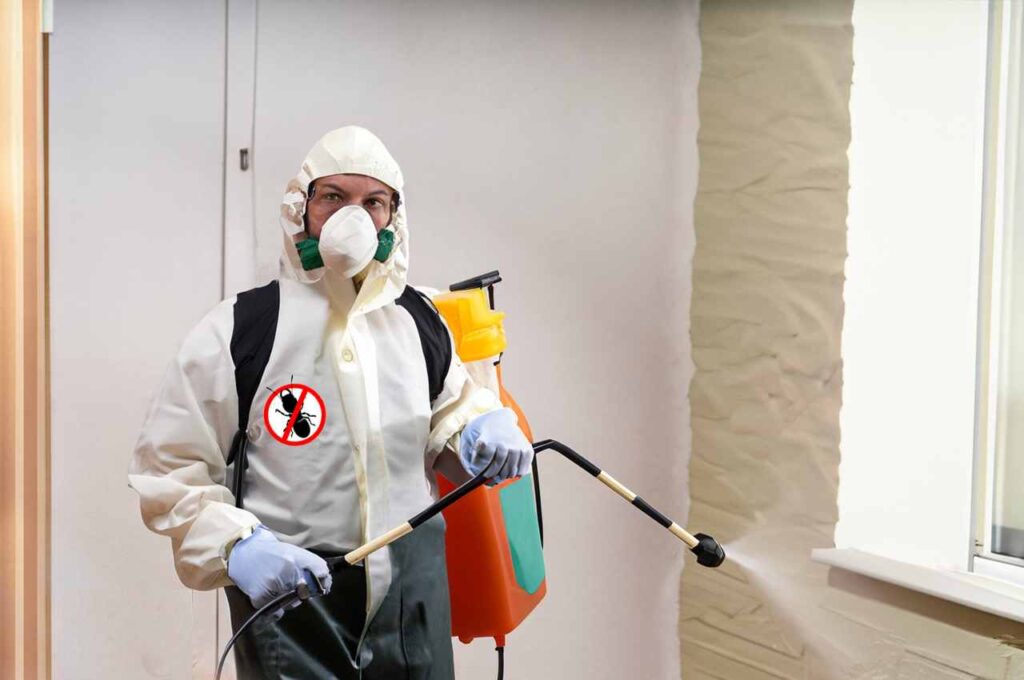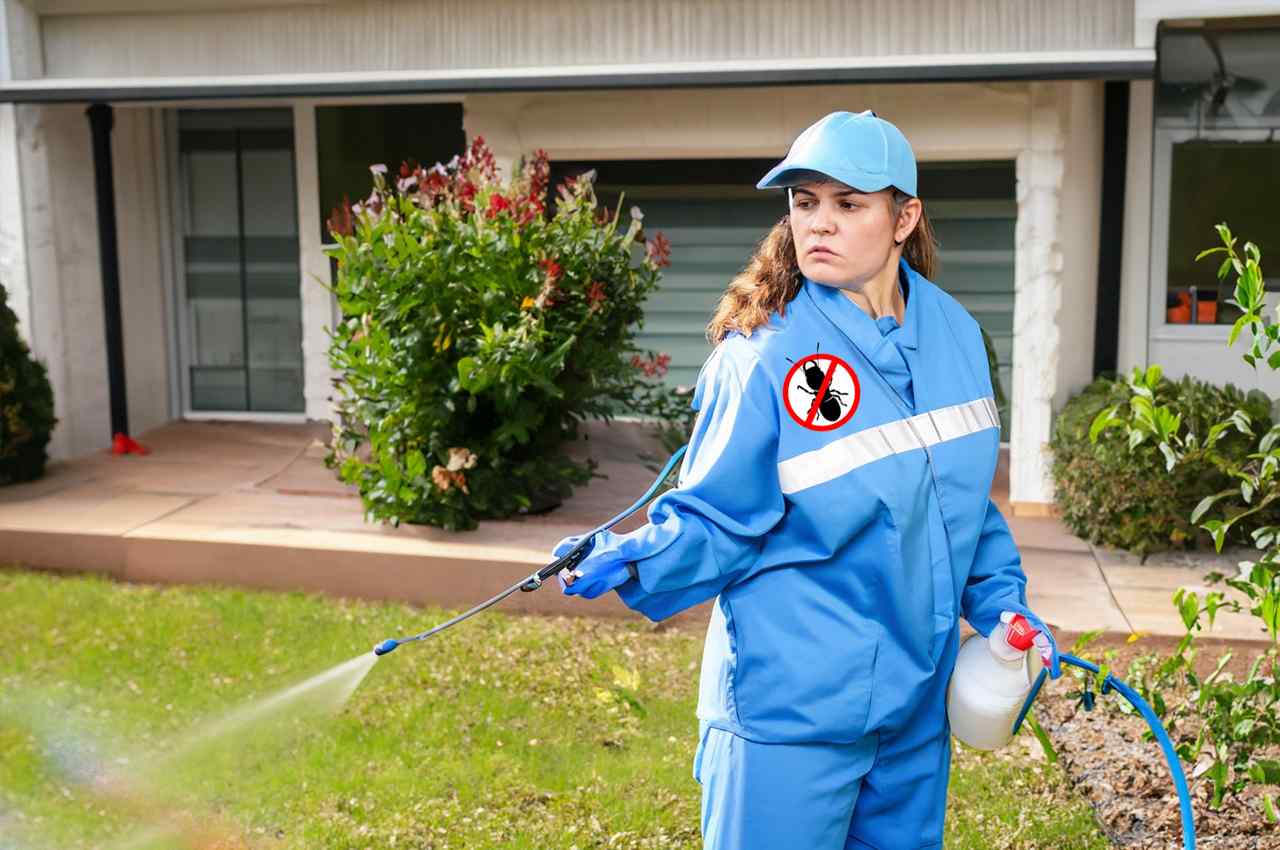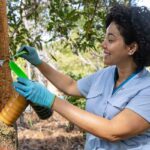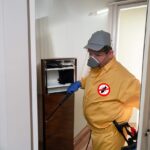One of the most popular questions we get asked on a routine basis is, How Often Termite Spray Keeps Your Home Safe? There is no simple answer to the question, despite the fact that it is an excellent query since it demonstrates how concerned the askers are with maintaining their properties and keeping their houses free of termites. The frequency of termite treatment varies depending on a number of variables, so it’s critical to adapt your strategy to your unique circumstances. Let’s find out in details.
How Often Should You Spray For Termites?
Depending on a number of variables, different spraying frequencies for termites may be advised. A common recommendation is to get your house examined for termites once a year. Regular inspections aid in the early detection of termite infestations, when they are easier to control and less expensive to cure. It’s important to take into account variables like the kind of termites that are common in your region, the intensity of infestations, and the particular treatments used, since they might affect how often spraying or termite control techniques are used. The best timetable for termite inspections and treatments should be determined after consulting with a pest control expert who is knowledgeable about the termite conditions in your area.
In Arizona, termite infestations are prevalent, thus the concrete slab is laid after the first treatment. The state requires this pre-treatment for subterranean termites. Arizona termite pre-treatments nowadays have a three-year warranty. The kind of treatment, product, warranty, and age of the structure or dwelling being protected determine the options after the first time.

Recommended Spray Schedule
| Year | Action |
|---|---|
| Year 1 | Initial Termite Treatment |
| Year 2 | First Annual Termite Inspection |
| Year 3 | Second Annual Termite Inspection |
| Year 4 | Third Annual Termite Inspection |
| Year 5 | Fourth Annual Termite Inspection |
Common Types of Termite Sprays
| Termite Spray Type | Targeted Termites | Form | Application Method |
|---|---|---|---|
| Chlorpyrifos | Subterranean and Drywood | Liquid Concentrate | Mixed with water and applied to the affected area |
| Fipronil | Subterranean and Drywood | Liquid | Applied to the affected area with a sprayer |
| Boracare | Subterranean (Not effective against Drywood) | Liquid | Applied to the affected area with a sprayer |
Effectiveness of Treatment
| Type of Spray | Effectiveness | Duration | Suitable Termite Types |
|---|---|---|---|
| Liquid Spray | High | 5+ years | Subterranean, Drywood |
| Bait Stations | Moderate | 1 year | Subterranean |
| Boric Acid | Low | Varies | Limited |
Beyond the Initial Warranty Period
After the initial guarantee period has passed, homeowners should carry out basic maintenance activities to make sure their properties are still termite-free. Consider an annual quality termite inspection before placing an order for more termiticide applications. Any circumstances on your land that can tempt termites to your house will be found with the aid of this examination.
Excessive wetness, particularly in the summer, and cellulose material like dead trees, old root systems, wood piles, or paper debris are two important things to watch out for. These are all excellent examples of termite food and possible triggers for termites to come to your house.
Dealing with Older Homes
Many individuals now reside in older houses that were pretreated with termite spraying many years ago. In these situations, homeowners should obtain information on previous termite treatment, details of any termite warranties, and the date of the most recent termiticide application. Annual inspections are necessary after five years. Many termiticides lose some of their potency after 10 years, therefore it is wise to think about getting a refresher treatment. Termite baiting and monitoring systems might be a great substitute for a conventional spray. These systems may support a professional pest management strategy where your house is periodically examined and don’t need trenching or drilling.
Understanding Termite Treatments
It’s important to understand that termites are a dangerous infesting insect that does substantial damage every year, and that practically every termite business would advise, “It’s not if you get termites, it’s when.” Termites alone infest thousands of houses and structures each year in Arizona alone. Every homeowner should make maintaining their property a top priority in order to keep it free of termites.
Knowing how long your therapy will continue is crucial when you do seek it out. You don’t want to take a chance on termites coming back and attacking your house again since they may do significant harm. The typical lifespan of a termite treatment is five years. While termite bait stations typically need yearly maintenance, liquid termite treatments may last much longer.
Frequency of Termite Inspections
| Factors | Effect on Frequency of Spraying |
|---|---|
| Type of Termite | Varies (Subterranean vs. Drywood) |
| Severity of Infestation | Varies (Mild vs. Severe) |
| Geographical Location | Varies (High vs. Low Risk Area) |
| Type of Treatment Chosen | Varies (Liquid vs. Bait System) |
Factors Affecting the Longevity of Treatment
Although treatments typically last five years on average, a number of variables may affect how long they are still effective:
1. Type of Termite: The duration of the treatment might vary depending on the type of termite infestation in your location. The most prevalent termites are drywood termites and subterranean termites. Subterranean termites construct tunnel networks to get their meal, which is the wood in your home, since they reside in the soil surrounding buildings. In contrast, drywood termites crawl into your wood and eat it from inside.
2. The size of the termite colony in your location has a considerable impact on the degree of infestation. Larger colonies need more time to completely eliminate. The efficiency of the treatment may also depend on how knowledgeable your termite specialist is.
3. Home Environment: Your home’s design affects how long the therapy lasts. All wooden parts of your house will need to be accessible for your termite expert. The therapy may not be as effective if these components are difficult to get or reach.
Types of Termite Treatments and Their Durability
1. Liquid termite treatments are usually effective for five years on average. A termite expert will create a trench around your house’s exterior and inject the liquid treatment there. While this provides good defense, termites may still locate cracks in the chemical barrier, necessitating yearly termite inspections to reduce the danger.
2. Termite bait stations: In order to be successful, these stations must be continuously inspected and maintained. A professional methodically lays baits all throughout your property. The dangerous bait is brought back to the termite colony by foraging termites, who then spread the disease to the other termites. It can take weeks or even months for termites to come across the bait stations, therefore it might take longer to completely eradicate the colony.
The Importance of Regular Termite Treatments
The most widely used approach for preventing termites in homes is to have pest control specialists spray your home with a long-lasting solution. When termites are treated, a potent chemical repellant that goes after them at the source is sprayed in a tiny trench excavated around the perimeter of your property. These sprays often last between 5 and 10 years, although it’s advisable to be safe and use them more regularly. When that period of time is almost over, it can be a good idea to have your house inspected for termite activity and to see whether the chemical barrier is still functioning.
Pest Control Bait Stations
However, spraying is not the sole method of termite treatment for your property. Termite bait stations are yet another widely used way of pest treatment and prevention. These are plastic tubes packed with wood chips or other termite bait that are buried underground around the outside of your property. When the termites carry the meal back to the colony, the poisonous compounds in the bait kill them.
At least once a year, and maybe more often if you’re dealing with a chronic infestation, these traps need to be replaced. These traps should completely eradicate any nearby termite colonies, but it’s advised to keep them restocked to avoid a re-infestation. You should have your house evaluated for evidence of termite infestation or presence at least once a year, whether you use termite bait stations or sprays. Pest control professionals can assess the extent of termite activity in your house by looking at the location of your bait stations.
Other Termite Prevention Tips
You may wait a bit longer between treatments if you are not currently dealing with or recovering from a termite infestation. However, it’s critical to take proactive steps in addition to using pesticide sprays or traps to stop them from tunneling inside your house. Removing any rotting or dead wood from your property, such as tree stumps, discarded branches, etc., is one approach to do this. Termite colonies drawn to the dead stuff will ultimately travel over, even if the wood is not directly near your house.
In a comparable way, avoid storing wood on floors or the ground. Store any wood piles or firewood that has been cut up off the ground, at least a foot or so, and keep it away from any structures, such as your house, barn, or shed. Take immediate action to repair any moisture damage to a fence, deck, or other wooden structure if you have it in order to prevent termites from settling there and making a home. Constantly wet and damp wood may also attract termites.
Conclusion
Termites may wreck your finances in addition to being an annoyance. Every year, these pests harm American houses to the tune of billions of dollars. In order to properly safeguard your house against termites, you must have a complete strategy that includes frequent inspections and, if necessary, treatments. To guarantee that your termite treatments are performed properly and provide long-lasting protection, it is advised to use a professional pest control firm. Remember that termites will invade your property at some point; the question is not whether they will, but rather when.
Frequently Asked Questions
Can termite spray be used indoors?
Yes, with the right precautions, termite spray may be used inside. When using termite spray inside, it’s crucial to have enough ventilation and to use safety equipment such gloves and masks. Given that various termite sprays are made for particular species of termites, it is imperative that you carefully read and follow the directions on the product label. Effective treatment requires the use of the proper spray for your specific termite infestation.
How does termite spray work?
Termite spray functions as a pesticide meant to get rid of termites right away. It has compounds that eventually kill termites by interfering with their neurological system. Termite spray is often applied to a building’s exterior and foundation, however it may sometimes be used inside as well. There are several termite sprays available that are designed for certain kinds of termite infestations, such subterranean or drywood termites. These modifications are designed to successfully battle the specific species of termites that constitute the problem.
How much does termite spraying cost?
The price of termite spraying may vary depending on your home’s size, the kind of termite infestation, and where it is located. Termite spraying normally costs between $500 and $2,500. With bigger houses, more severe infestations, and high-risk locations possibly incurring greater costs, the actual cost may vary from this average. Smaller houses and fewer severe infestations, on the other hand, can result in cheaper termite spraying expenses.
How long does termite spray last?
A termite spray treatment’s durability might change depending on a number of variables. Termite sprays typically have a lifespan of one to five years. The kind of termite spray used, the extent of the infestation, and the location of your house may all affect how long the treatment will take. For instance, liquid termite sprays often last less time than bait-based sprays. The most common kind of termite in the United States, subterranean termites often need more frequent treatment than drywood termites. Homes situated in locations at high risk of termite infestation can also need more regular spraying to maintain protection. To choose the best spray type and treatment plan for your unique situation, it is essential to speak with a pest control specialist.
How long does termite spray smell last?
Depending on a number of variables, termite spray odor persistence might differ. Compared to bait-based termite sprays, liquid termite sprays often have a stronger and longer-lasting stink. Liquid termite spray odors may linger for many days, particularly in places with poor ventilation. Bait-based sprays, on the other hand, often have a softer aroma that disappears more quickly, especially in well-ventilated areas. It’s advised to provide appropriate ventilation by opening windows and doors, utilizing fans, or letting fresh air to flow through the treated area in order to reduce the residual smell.
How long does it take for termite spray to work?
Depending on a number of variables, termite spray may not work as quickly or effectively as it should. Termite sprays that kill termites instantly may take up to 24 hours to start showing results. But a number of factors might affect this timetable. For instance, a big factor is how bad the termite infestation is. For more severe infestations, more time may be needed for the spray to completely get rid of the termites. Additionally, the efficacy and length of the treatment may vary depending on the species of termites involved and their placement inside the building. It’s crucial to adhere to the advice given by pest control experts and give the termite spray enough time to work effectively. To track the situation and guarantee the termites have been completely eliminated, regular inspections may also be required.
What month is best to spray for termites?
Winter is often the ideal time to spray for termites. In colder climates, termites are often less active, and throughout the winter, colonies tend to slow down or become less active. Due to their increased likelihood of coming into touch with the chemicals during this period of decreased activity, termites are best treated and sprayed during this period. Additionally, since termites are less likely to discover other moisture sources throughout the winter, the drier soil conditions may improve the efficiency of termite control efforts. It’s crucial to remember that the precise time might vary depending on the environment and geography, therefore speaking with a pest control expert is advised to find the best timing for your location.
What happens after you spray for termites?
Termite spraying is generally followed by a thorough procedure. A pest control expert first does a comprehensive house examination to look for any indications of termite activity or infestation. The expert next applies the termite spray to the house’s exterior and foundation, paying particular attention to regions where termites are known to be active or have possible entrance sites. In order for the spray to properly dry and settle, tenants are often needed to depart the area for several hours. Additionally, a follow-up meeting with the pest control specialist is often scheduled within a few weeks to assess the treatment’s effectiveness and ensure the population of termites has been successfully controlled or reduced. In order to confirm that the termite infestation has been appropriately managed and to provide homeowners confidence in the efficacy of the treatment, this post-treatment inspection and follow-up are essential measures.
Is termite spray harmful?
Yes, improper use of termite spray may be dangerous to both humans and pets. To decrease risks, follow the label’s instructions and use gloves and a mask while administering the product. Termite spray’s specific side effects can vary depending on the type of spray employed, but they can include skin irritability (causing redness, itching, and swelling), eye irritability (causing redness, watering, and pain), respiratory issues (such as coughing, shortness of breath, and wheezing), as well as—in some cases—nausea, vomiting, and headaches. It is advised to seek urgent medical assistance if any of these negative effects appear after using termite spray. In addition, it’s crucial to keep kids and animals away from locations where termite spray has been used since these actions might result in dangerous consequences if ingested or inhaled.
Can we inhale termite spray?
Due of the possible health concerns, it is highly advised against inhaling termite spray. Termite spray includes chemicals that, if breathed, may be dangerous and cause a number of respiratory issues, including coughing, wheezing, and shortness of breath. In extreme circumstances, termite spray inhalation may potentially be lethal. It is crucial to seek prompt medical help if accidental inhalation happens so that a professional evaluation and the best course of action may be determined. Wear safety gear including masks and gloves, rigorously follow the label’s recommendations while using termite spray, and make sure the treated area is well ventilated to release any dangerous chemicals. In order to choose the best treatment for your property while putting safety first, it is advised that you speak with a doctor or pest control specialist if you have any worries about the safety of utilizing termite spray.
Can termite spray make you sick?
Termite spray might get you ill if you don’t take enough precautions. Termite spray contains compounds that may cause wheezing, shortness of breath, and coughing. Additionally, these drugs could result in swelling, itching, and redness. Eye irritation, which results in redness, moisture, and pain, is another effect. Exposure to termite spray may result in vomiting, nausea, headaches, lightheadedness, fever, and even death. Seek medical attention if you experience any of these symptoms after being exposed to termite spray. To prevent termite spray disease, it is crucial to follow the label’s instructions. Gloves and a mask are required. The treated area has to be adequately ventilated in order to dissipate harmful compounds. Before selecting a treatment for your home, see a doctor or pest control specialist if any termite spray safety concerns arise.
What kills termites spray?
Termites may be killed using a variety of termite sprays. The most popular types include termite bait stations, chlorpyrifos, fipronil, and boracare. A broad-spectrum pesticide called chlorpyrifos is effective against both drywood termites and subterranean termites. It is a liquid concentration that is applied to the afflicted region after being diluted with water. The more contemporary pesticide fipronil, which is administered in liquid form using a sprayer, is effective against both drywood termites and subterranean termites. The non-toxic pesticide Boracare, on the other hand, is made from boric acid. It works well against subterranean termites but is ineffective against drywood termites. Using a sprayer, it is administered as a liquid. Termite bait stations are a good alternative for those who want to stay away from toxic pesticides. These stations carry poison that kills termites when consumed and are deliberately positioned where termites are active. The kind of termite, the extent of the infestation, and the available funds all play a role in the choice of termite spray.
Are there any termite sprays for trees?
No, there aren’t any termite sprays designed exclusively for trees. The main purpose of termite sprays is to get rid of termites that have already colonized houses or other buildings. They are ineffective in stopping tree termite infestations. Consult a qualified arborist or pest management expert if you are worried about termites in your trees. They can provide effective treatments and preventative measures tailored to your particular trees.
- How do termite mounds help regulate temperature? - 7 January 2024
- 10 Effective Termite Control Methods That Actually Work - 4 January 2024
- How Long Does It Take for a Termite Mound to Form? - 21 December 2023




